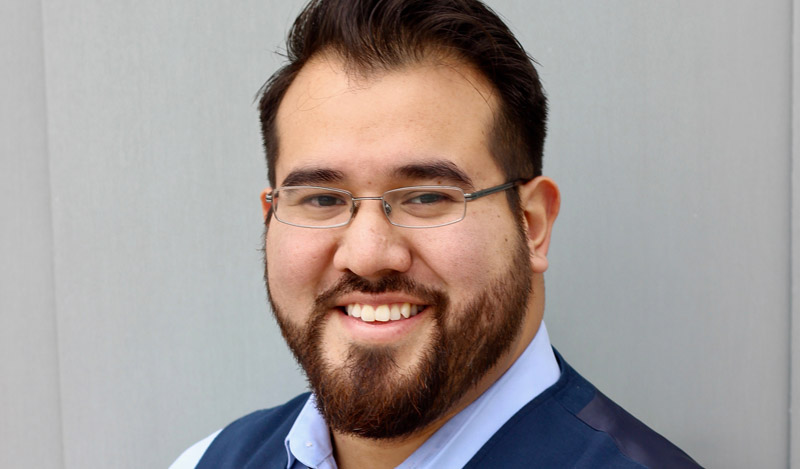
Nick Lopez, director of campus ministry for the University of Dallas, is one of three young adult delegates selected by the U.S. bishops to attend a pre-synod gathering in Rome March 19-25. (CNS photo/courtesy Markalya Johnson)
WASHINGTON (CNS) — Nick Lopez hopes to emphasize a number of topics at the pre-synod gathering, among them, the broadness of Latino/Hispanic American experience, the need for mental health training for young adult ministers and a better understanding of what the word “vocation” means.
The director of campus ministry at the University of Dallas, Lopez, 27, is one of three U.S. delegates chosen to participate in a weeklong gathering at the Vatican in preparation for October’s synod of bishops on young people, the faith and vocational discernment.
Born and raised in San Antonio, Lopez said that “from a very young age, I’ve always felt for young people” and initially planned to become a theology teacher to help students transition to live their faith beyond high school.
[hotblock]
As an undergraduate at the University of Dallas, the then-director of campus ministry empowered him to lead a confirmation retreat and helped him realize that his gifts were better suited for ministry with college students.
At the pre-synod gathering, Lopez, a Mexican-American, plans to stress the diversity and breadth of what he refers to as the Latino/Hispanic experience in the United States.
It’s difficult to define Latinos and Hispanics with one term, he said. “We’re diverse. We come from all walks of life and different cultures.”
“When you try to pigeonhole us into Latinos or Hispanics, you realize you’re putting together a lot of people because one of their common backgrounds is that they all might speak Spanish — and that’s it.”
To better serve such a broad community, the pastoral response needs to be regional, Lopez said.
“Know who your community is,” Lopez said, and “get someone from the community and empower them to be leaders in the parish, to be leaders in university campuses, to be leaders in independent young adult groups.”
[hotblock2]
Parishes and ministries should also keep in mind that not all Latinos speak Spanish, said Lopez, who can understand and read, but not speak Spanish.
“Hispanic and Latino is more than just the language,” he said, and simply looking at bilingual aspects when creating programing is not enough.
Another topic Lopez plans to bring to the pre-synod gathering is mental health.
What has surprised Lopez in his ministry is how much of an advocate he has become for the pastoral care of individuals with mental illness.
He is open about his own struggles with anxiety and depression, and shares them with his students, where appropriate.
“I’m not a therapist or a counselor, but I’ve noticed that in the past two to three years, I’ve become more aware of the need for psychology, not just in my own life,” he told Catholic News Service, “but just seeing a lot of my students go through it.”
In a guest column for the CNS young adult series, “In Light of Faith,” Lopez urged “all ministers who accompany young people to take mental health seriously, to take time to educate themselves on these matters and, most important, to refer young people to reputable counselors when necessary.”
[tower]
Lopez plans to organize training for staff and faculty at the University of Dallas to recognize signs of anxiety or depression in students and to create greater awareness of mental health concerns.
For Lopez, pastoral care doesn’t end with a referral to counseling. “Those I direct to counseling on or off own campus, I walk with them as well to follow up and see how they’re doing,” he said.
At the 2017 U.S. bishops’ Convocation of Catholic Leaders in Orlando, Lopez participated in a panel covering the vocation to the single life, and it is a topic he plans to discuss at the pre-synod gathering.
Over the past five years of his professional ministry, he has noticed that young people often view the vocation to single life as negative, even painful.
Millennials can mistakenly fall into thinking that single life is “a period of waiting for what your actual vocation is,” Lopez said.
Lopez also believes there is a tendency among young people to oversimplify the word vocation to the questions: Are you married? Are you a religious? Or are you single?
Vocation is more nuanced. “Your vocation is a call to holiness, a call to live out your baptismal call, your baptismal promises,” he said. “Your vocation is a lot more about who are you in relation to God and his church, and certainly marriage, single life and of course being a religious plays into that.”
A re-education within the church of what it means to have a vocation might help young people better understand that with any vocation, whether marriage, holy orders, consecrated or single life, the church’s universal call to holiness is lived out and renewed every day.
Some of his students can confuse vocation and career. Lopez said, “I always have to re-emphasize: Your vocation is not what you do, your vocation is who you are. What you do from 8 to 5 on a weekday is not who you are, that’s what you do.”
Most Catholic young adults know a vocation as a call from God, Lopez admitted. “And as long as we have that foundation, we can build up from there,” he said.
***
Capizzi is the special projects editor at Catholic News Service.
PREVIOUS: One goal for delegate is to bring greater awareness to religious life
NEXT: Symposium celebrates donation of Father Neuhaus’ papers to university



Share this story